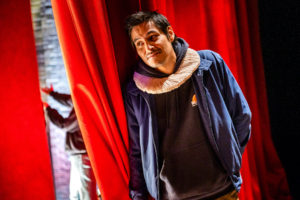
By Kristen Lawson
Montreal’s Festival TransAmériques, which brings in contemporary dance and theatre from around the world, also offers annual seminars on critical dialogue. This summer I attended the English version of the seminar, Conversations on Performance, as an arts writer and marketer. (The seminar is also held in French.)
Seventeen participants between the ages of 25-35 gathered from across Canada, Europe, and Japan, with disciplines ranging from acting and dancing to scriptwriting, choreographing, directing, producing, and more. Over nine days we conversed with nine guest speakers; attended eight performances, each with their own Remember and Respond session; experienced three workshops; and enjoyed four (optional) dance parties.
Before beginning, we discussed how we would approach our conversations on art. How would they be facilitated in a way that included everyone’s voices in a large group? How could we ensure respectful dialogue while also leaving room for disagreement? These are questions we had to continue considering throughout the seminar as we learned more about each other, and whether our methods of communication generated conversation or shut it down.

We shared our impressions of each performance in the Remember and Respond sessions, which usually took the form of sitting in a circle chatting. One consisted of writing single words on pieces of paper and arranging them by theme, another by role playing as professionals involved in the production. For me, the hardest part was trying to dissect so many different performances directly after seeing them, with little time to digest the subject matter.
Our first session was with dramaturge and curator Melmun Bajarchuu, who focuses her practice on reshaping cultural practices to eliminate discrimination and expand diversity. She urged us to approach the festival with decolonization in mind, asking, “How do we move past current practices and into a future that’s better for everyone?”

Other guest speakers had us consider topics such as the nature of dramaturgy, how our identities and experiences affect both our work and our critiques, and when more context is necessary following a performance in order to fully understand it. Writer and performer Dominique Leclerc told us that her work i/O, an exploration of transhumanism, should automatically come with a post-show talk. With William Shakespeare’s As You Like It, A Radical Retelling by Cliff Cardinal, the Oglala Lakota theatre artist prefers to let the work speak for itself.
During Dana Michel’s three-hour long production, MIKE, each patron was given a blanket to sit or lie on, and could come and go as they pleased while Michel improvised, slowly moving objects around the large room. The atmosphere was relaxed, but the work was opaque, and the space offered no alternative for those like myself who need back support and can’t sit on the floor for long periods. In our Remember and Respond session, we found ourselves discussing both physical and artistic accessibility. Can any environment meet the needs of every person? Does a work need to cater to the general public, or can it be niche and cryptic, yet still appreciated for what it is?
David Lavoie, the festival’s general director, and artistic co-directors Jessie Mill and Martine Denewald, provided insights into production and programming. Mill shared her and Denewald’s goals to take the festival in new directions, supporting more works in progress and lesser known artists.

We were treated to two dance workshops, which was plenty for the theatre practitioners and not enough for the dancers in the group. Navy Blue’s Amancio Gonzalez led us through cerebral movement exercises accessible to all levels of movers. In contrast, In My Body’s Crazy Smooth taught intricate, fast-paced house choreography.
Conversations on Performance mediator Leslie Baker made room on the sixth day for a cohort-led initiative of our own devising. We were feeling the fatigue of our intense schedule, and opted to leave the classroom-style setting to have a more personal discussion about art that moves us, and our own artistic practices, while lounging on the grass near the St. Lawrence River.
I left Conversations on Performance with more questions than I had going in. It reminded me of being in university, having philosophical conversations on the nature of art every day, something I hadn’t experienced in a decade. I’m grateful to Festival TransAmériques for providing a platform in which I could engage with others in this way, and question all of my assumptions, again.

